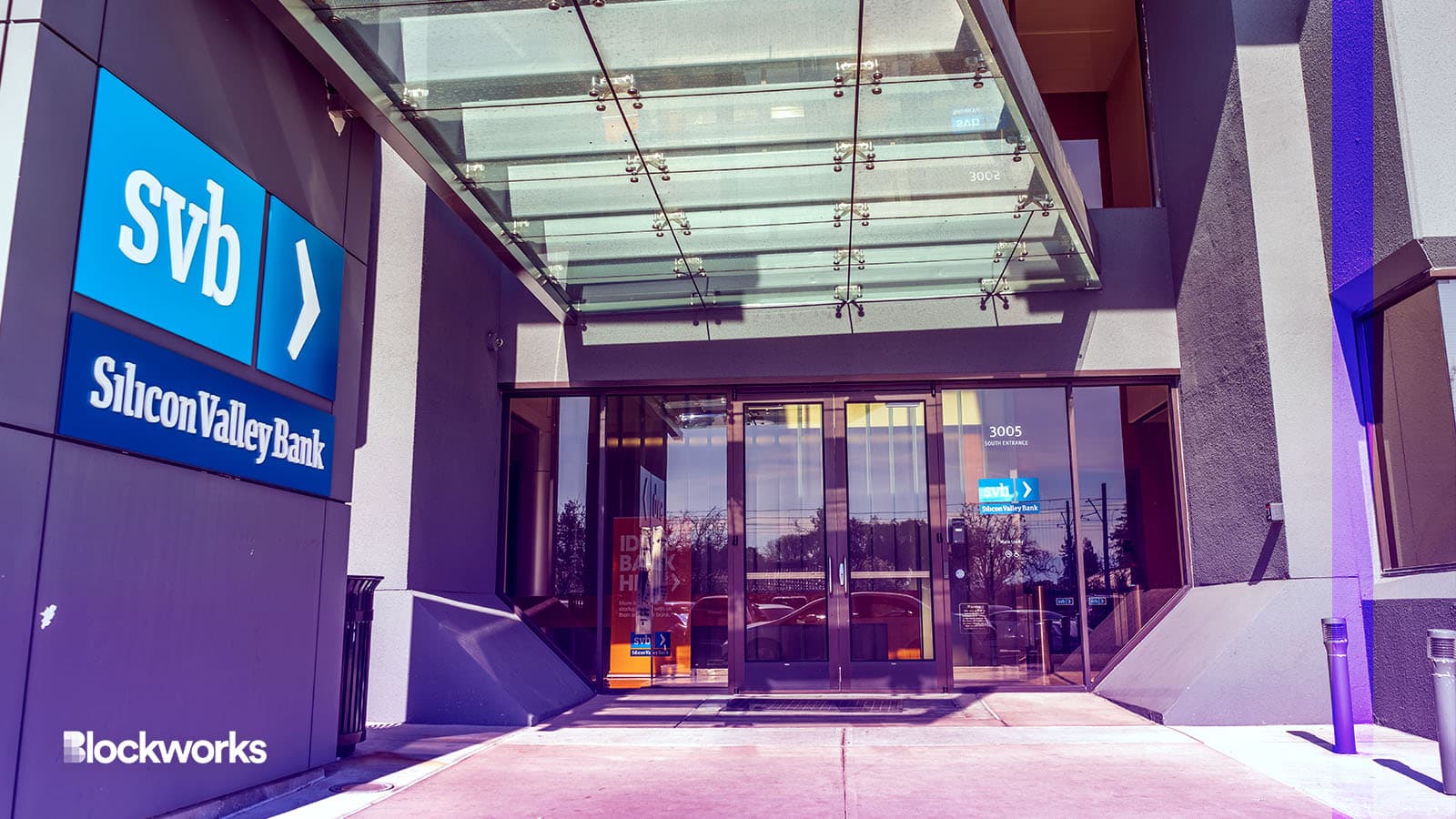Silicon Valley Bank Meltdown Has Little to Do With Crypto
SVB’s stock plummeted earlier in the week as investors parsed the possibility of further financial trouble to come

Source: Shutterstock / Sundry Photography, modified by Blockworks
Silicon Valley Bank (SVB) is having its Silvergate moment.
California regulators moved to force the bank to cease operations on Friday and tapped the Federal Deposit Insurance Corporation (FDIC) to oversee its unwinding. Though SVB has historically been a Silicon Valley financial favorite, a number of crypto firms in recent years have become clients, sources said.
Industry participants are now waiting to see how the FDIC process plays out, as attention shifts to the agency’s role in making clients whole. All SVB clients with assets up to $250,000 custodied by SBV will have “full access to their insured deposits no later than Monday morning,” regulators said in a statement.
The Californian Department of Financial Protection and the FDIC created a new entity, the Deposit Insurance National Bank of Santa Clara to protect all insured depositors. The FDIC insures up to $250,000 of funds, a provision that applies to all registered and US-based banks under its jurisdiction.
More than 93% of the bank’s $161 billion in deposits are not insured, according to a Bloomberg report. Multiple crypto firms had already moved earlier in the week to pull cash deposits under the bank’s custody, according to three sources familiar with the matter.
The quick collapse of the tech-focused SVB, the 16th largest US bank, has sent venture capitalists and their counterparties reeling, including traditional financiers with crypto dealings. It had plummeted 62.77% this week, wiping out more than $80 billion from its market capitalization, before trading of its NASDAQ-listed stock was halted on Friday.
In its year-end SEC 10-K report, SVB said it had “minimal exposure to cryptocurrency and digital assets through loans to, deposits from and investments in clients engaged in those industries.”
Brent Xu, CEO and co-founder of Umee, told Blockworks that SBV’s demise shows “the limitations of centralized banking institutions,” adding that “in short, centralized banks are often prone to these kinds of failures.
“This is a matter, above all, of transparency, or the lack thereof,” Xu said. “For the digital asset industry, this underscores the need to build out decentralized infrastructure.”
“Liquidity crisis” weighing banks down
Similar to Silvergate, James Butterfill, head of research at CoinShares said SVB’s downfall “has revealed the way many banks treat unrealized fair value losses marked as held to maturity.”
“They do not need to be reported in the income statement, partially obscuring their vulnerabilities to investors,” Butterfill told Blockworks. “This is fine until there is a liquidity crisis, where the bank is forced to sell those assets on the open market, such as when deposit withdrawals force their hand.”
SVB’s solvency has been hindered by the dramatic rise in government-backed securities yield.
The top four US banks — JPMorgan Chase, Bank of America, Wells Fargo and Citibank — have booked a cumulative decline in market value of $50 billion since Thursday alone, one key example of SVB’s issues spreading fast.
“Separately, Bitcoin prices fell dramatically last year, they both have the common link in being negatively impacted by rising interest rates,” Butterfill said.
“We are beginning to see the really negative impacts of misallocation of capital to projects that are detached from the real world. When capital is cheap all sorts of questionable endeavors get funding, as was the case during the dotcom bust. Rising rates are exposing these misallocations.”
Crypto waiting for banks to “step up”
The crypto industry is not directly correlated with SVB’s turmoil, but expectations are that the failure of the bank will no doubt impact digital asset players — especially considering the number of venture firms that make crypto investments that banked with SVB.
Connor Ryder, a researcher at Kaiko, told Blockworks that “the fall of big banks is a reminder of how cut-throat a bear market can be.”
“The biggest implication of this banking contagion in the near term will be a reduction in liquidity in markets, which would lead to more volatile price movements in both directions,” Ryder said.
Kaiko liquidity data shows US crypto exchanges have been directly impacted by evaporating liquidity over the past few days as market makers adopt a wait-and-see approach with the industry.
“The crypto industry is waiting for a bank to step up and welcome crypto deposits, but it may be waiting a while – big banks have a disincentive at the moment to take on crypto clients due to the risk they bring,” Ryder said. “The candidate will likely come from a smaller bank, but after the Silvergate collapse they won’t be rushing to put their hand up.”
Michael Bodley contributed reporting.
Updated March 10 at 12:58 pm ET. Additional context and quotes throughout.
Get the news in your inbox. Explore Blockworks newsletters:
- The Breakdown: Decoding crypto and the markets. Daily.
- 0xResearch: Alpha in your inbox. Think like an analyst.






